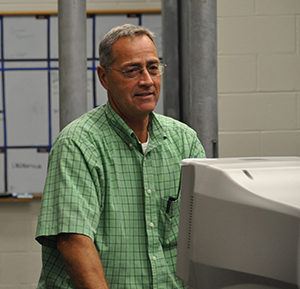 Terry Blanchard, DVM, MS (Retired)
Terry Blanchard, DVM, MS (Retired)
Professor of Equine Theriogenology
Department of Large Animal Clinical Sciences
Someone near and dear to us retired on August 31, 2017. Dr. Terry L. Blanchard served as a guiding light to us for decades and his daily presence in the office, in the lecture room, on the clinic floor, in the research laboratory, and at assorted Section of Theriogenology gatherings will be sorely missed by all of us. Those of you in the horse industry will also be impacted by his absence.
Dr. Blanchard has been a steadfast mentor to those faculty members remaining in the Equine Theriogenology program in the Department of Large Animal Clinical Sciences (VLCS) at the Texas A&M School of Veterinary Medicine & Biomedical Sciences (VMBS). As a faculty member at the University of Pennsylvania’s famed New Bolton Center, he was a devoted teacher to Drs. Hinrichs (who has relocated back to the University of Pennsylvania), Love, and Varner when they completed their residency programs and his skillful mentoring greatly impacted their clinical prowess and successful examination through the American College of Theriogenologists. As all of us eventually relocated to the VMBS, Dr. Blanchard continued to guide us here. While at the VMBS, Dr. Blanchard also served as a residency mentor to Dr. Brinsko, and countless other trainees that have had successful career paths in clinical practice, academia, and the pharmaceutical industries following their educational experience here.
His impact in the research arena has been extremely enriching to practicing veterinarians and those in the horse industry alike—with research studies directed at both stallions and mares. A few examples include investigations of testicular function and degeneration, internal genital infections, genetic causes of subfertility, and insemination strategies in stallions, and ovulation-inducing agents, foal-heat breeding strategies, diagnosis and treatment of endometritis, and mare reproductive loss syndrome (MRLS)-related fetal losses in mares.
Dr. Blanchard also did all in his power to ensure that students received the best education possible, including laboratory experiences and exposure to clinical cases. As a gauge of his commitment and performance in the teaching arena, he received both college-wide and university-wide awards in teaching. This honor has not been bestowed on any other theriogenologist at Texas A&M University in its entire history.
He regularly organized symposia in equine theriogenology for practicing veterinarians while at Texas A&M University. Each year, he was dedicated to providing state-of-the-art information to symposium participants, never being satisfied with a rehash of the basics of reproduction in clinical practice. Another measure of Dr. Blanchard’s commitment to the dissemination of information to students, horse owners, farm managers, and practitioners is the authorship of three textbooks on equine reproduction. These textbooks have received acclaim from their readership.
Dr. Blanchard’s academic accomplishments, intuitive nature, work ethic, sincerity, and warm personality will live on through all of us that have been so blessed by his presence. We wish him all the best in retirement, but we sincerely hope that he will regularly stop by to ensure that we continue to live up to his expectations.
We miss you deeply, Dr. Blanchard!
